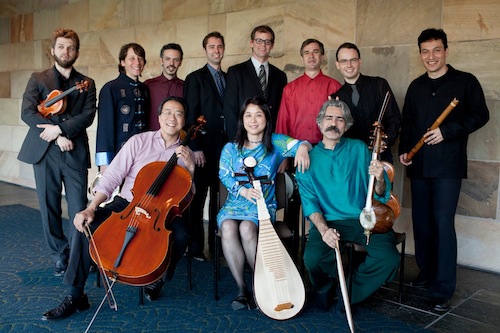Ma, Silkroad Ensemble mark 20 years with dynamic and diverse musical mix
Cultural diversity is what makes us unique and stronger; and in the case of the Silkroad Ensemble – enthralling to listen to. This theme was articulated numerous times Monday night, verbally and musically, at the closing concert of their tour at the Adrienne Arsht Performing Arts Center.
Since its inception at Tanglewood 20 years ago, this idiosyncratic collective has found an entertaining and inclusive way to show off the cross-pollination of cultures of the ancient trade-path of the Silkroad and beyond.
With instruments ranging from Indian tabla and Galician bagpipes to strings, the Silkroad Ensemble and cellist-founder Yo-Yo Ma brought together the worlds of Vietnam, India, Syria, Galicia, Israel, Iraq, and France, showcasing the musicians as performers and creators.
The first half was constructed in a suite form with six short pieces. Percussionist Shane Shanahan was commissioned to write Saidi Swing, an upbeat, intricately overlaid texture of percussion based on Arabic rhythms.An arranged traditional Vietnamese tune, Uot Mi, followed with soft syncopated piano chords and peaceful melodic lines in the cello, clarinet, and violin.
Clarinetist Kinan Azmeh wrote The Fence, the Rooftop, and the Distant Sea in 2017. The “Dance” opens with a soaring duet between Azmeh and Ma. It soon transitioned into a compound-rhythm dance, joined by the ensemble with sharp attacks, accentuated off-beats, and vibrant trills and tremolos.
Pianist and Galician bagpipe virtuoso, Cristina Pato’s arrangement of John Zorn’s “Khabiel” from Book of Angels started with unobtrusive double bass pizzicato and clapped rhythms. It quickly moved into an intense, tone-bending bagpipe cadenza and a dazzling improvisatory solo on tabla by Sandeep Das.
Olivier Messiaen’s “Louange à l’éternite de Jésus” from his Quatour pour la fin du temps, brought the party to a halt. Ma and Pato attempted to capture the timelessness of the music, but the hyper-energy of the program may have contributed to an overly emphatic projection of the chords on Pato’s end, detracting from the reverent and contemplative expression of the score.
In a retrospective of a king turned Buddhist, Das’ composition King Ashoka started with three gong chimes and chanting. The initially soft rhythmic palpitations transitioned into complex interplay. Inhabiting both composed and improvised worlds, this King Ashoka explored a variety of textures from homophonic precision of fast passages to free-form improvisations over drones. The infectious joyfulness of the performance was met with similar response from the audience.
The second half unfolded as an ode to love and life. Composed by Ljova, a Russian-Jewish violist based in New York, Everywhere is Falling Everywhere is inspired by a poem by the 13th Century Persian poet Rumi. This piece epitomized the folk-fusion roots that are apparent in the ensemble’s programming.
Pato’s My Lethe Story was inspired by Greek mythology, Galician history, and her own personal experience with her mother’s memory loss. The dynamic score included narration, a lullaby, a touching duet between piano and clarinet, and a jubilant tutti section. This composition crossed over the boundary of performance, into a bittersweet projection of a slice of life.
Wedding, another original composition by Azmeh based on traditional Syrian idioms, capped off the evening with oscillating moods, from tenderness in the opening section to the blazing improvisations that highlighted all the musicians of the ensemble. Azmeh dedicated this piece to all those Syrians who in spite of adversity have allowed themselves to fall in love in the past seven years.
Posted in Performances, Uncategorized
Leave a Comment
Tue Apr 24, 2018
at 11:47 am
No Comments







